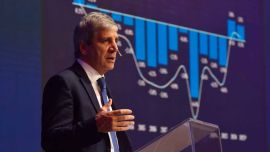Maize in a maze would be as good a way as any of describing the government’s slapdash suspension of corn exports early in this new year, only to retreat before mid-January in the face of a fairly toothless farm stoppage – with so much lockdown, we can do without lockout.
At first sight this futile petty skirmish may seem to have little in common with the epic conflict over export duties in 2008-2009, apart from the obvious common denominator of clumsy state intervention in the country’s most dynamic sector. But a closer look at the complexities back then might bring it nearer to the U-turns of the past week.
The current presidential duo is often presented as if they were a reincarnation of Lord and Lady Macbeth almost 1,000 years after their real (as opposed to Shakespearian) lives, contrasting the ideological monomania of the female of the species with the contradictions springing from the indecisive personality of Alberto Fernández and the complexity of his Frente de Todos coalition alike.
The broad sweep of history would seem to favour that contrast if we look at the advance of the public sector from 23 to 41 percent of Gross Domestic Product under the three Kirchner presidencies between 2003 and 2015, but a more detailed examination of those years would show a series of spasmodic and reactive lurches rather than a relentless tide. If so, the contradictions in this pan(dem)ic-stricken administration could be stemming from both halves of the presidential ticket and not just the top.
But rather than generalise further, let’s get back to the farm to illustrate the point and put the clock back almost a dozen years to the start of the epic clash with the enactment of Resolution 125 introducing a sliding scale for grain export duties on March 11, 2008 (a date which is also the birthday of this columnist’s son, who has been heard to ask why such disasters as Atocha, Fukushima and Resolution 125 have to happen on his special day).
Setting that date in its international and local context, the massive global financial and economic crisis of 2008-2009 was well on its way – the subprime mortgage bubble was already bursting as early as mid-2006 with the dominoes really starting to fall as from August, 2017 – but Fannie Mae & Freddie Mac and Lehman Brothers were still too big to fail for a further six months. The first term of the Cristina Fernández de Kirchner presidency was only just moving into full gear after delivering her maiden state-of-the-nation speech at the start of that month. Elected on a “Cristina, Cobos y vos” campaign slogan the previous spring, her basic pitch was that if her husband Néstor had done a splendid job in placing the Argentine economy on a growth path, the defining feature of her presidency would be restoring institutional health, declaring Angela Merkel’s Germany to be her model.
Resolution 125 provoking such a strong farming backlash is generally seen as blatant grain greed by a fiscally rapacious urban populism but the full story is as slippery as its sliding scale – something which has much to do with the youthful economy minister making the announcement, Martín Lousteau, today a Radical senator for the City for which he is very much a mayoral (and hence presidential) dark horse. Argentina’s youngest economy minister ever at 37 and with the Bapro Buenos Aires provincial bank presidency since 2005 as almost his only credential, Lousteau came from virtually nowhere to star in the brand-new CFK cabinet. A rise which might be difficult to explain without reference to physical appearance being a major criterion in the Cristina Kirchner scale of upward mobility, as current Health Minister Ginés González García can bear witness – after universally acclaimed service in that portfolio under her husband Néstor, Ginés was immediately dumped by CFK on the grounds that the tubby surgeon lacked the physique du rôle for preaching health. To this columnist at least the image of Lousteau in that Cabinet evokes that line from ‘Hotel California’: “She got a lot of pretty, pretty boys, that she calls friends.”
But rather than a pretty face, Lousteau was too clever by half in his devious formulation of Resolution 125. Although grain export duties were already high enough at 27 percent following a recent increase, the pressures within the government for a further squeeze were irresistible since commodities were becoming the last of the bubbles prior to the worldwide crash – soy prices were to top US$600 per ton in mid-2008. A government doubling the size of the public sector felt that such enormous surplus value should accrue to the state rather than an electorally minor farming sector and then Domestic Trade Secretary Guillermo Moreno (with whom Lousteau famously argued in public at an open-air government ceremony) pushed for a flat rate of 70 percent.
To absorb these pressures while preserving some sanity, Lousteau came up with the sliding scale. Starting at 23.5 percent for US$200 per ton of soy, export duties progressively rose up to 58.5 percent for a world price of US$750 but neither extreme matched any realistic expectation – the likely price range made an export duty of 35-43 percent the most probable. But this 23.5-58.5 percent range also projected to 90 percent in the inconceivable event of world soy prices entering four digits – while almost halving Moreno’s target percentage, Lousteau could simultaneously claim to top him with this 90 percent and the figure was aired for that purpose. But that percentage was also seized by protesting farmers and the opposition to play up the confiscatory extremes of the new levy with the result that they became vox populi, contributing to majority rejection of the new export duties.
Wholly unsuited to the government, the London School of Economics MSc Lousteau was out within six weeks of Resolution 125 as one of the scapegoats, to be followed just 10 weeks later by then Cabinet Chief Alberto Fernández. And so it began. No space here to carry the tale further but with commodity prices again becoming a refuge for excess liquidity and the government facing a record fiscal deficit of almost seven percent of GDP, push should come to shove soon enough and we can return to this topic.























Comments